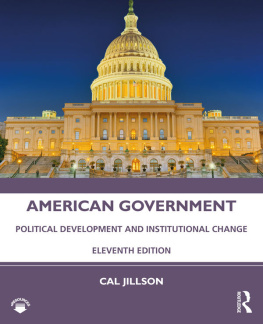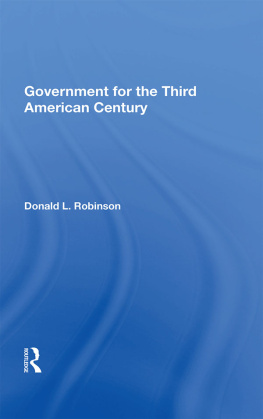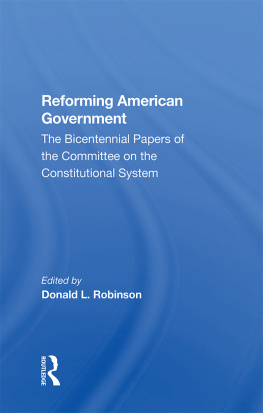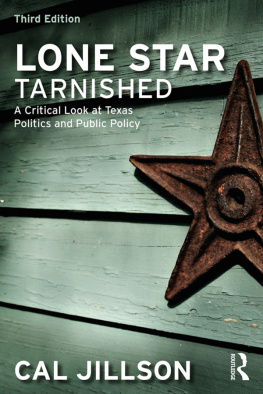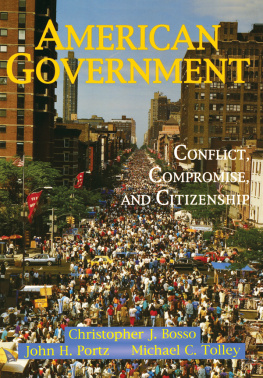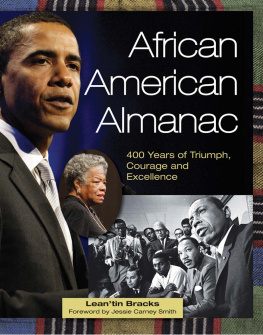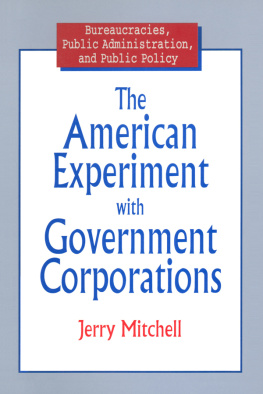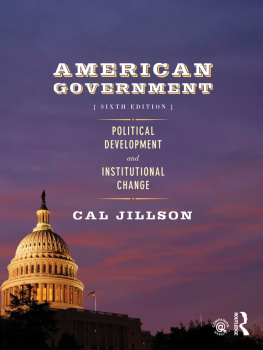Jillson - American Government
Here you can read online Jillson - American Government full text of the book (entire story) in english for free. Download pdf and epub, get meaning, cover and reviews about this ebook. year: 2021, publisher: Taylor and Francis, genre: Politics. Description of the work, (preface) as well as reviews are available. Best literature library LitArk.com created for fans of good reading and offers a wide selection of genres:
Romance novel
Science fiction
Adventure
Detective
Science
History
Home and family
Prose
Art
Politics
Computer
Non-fiction
Religion
Business
Children
Humor
Choose a favorite category and find really read worthwhile books. Enjoy immersion in the world of imagination, feel the emotions of the characters or learn something new for yourself, make an fascinating discovery.
American Government: summary, description and annotation
We offer to read an annotation, description, summary or preface (depends on what the author of the book "American Government" wrote himself). If you haven't found the necessary information about the book — write in the comments, we will try to find it.
American Government — read online for free the complete book (whole text) full work
Below is the text of the book, divided by pages. System saving the place of the last page read, allows you to conveniently read the book "American Government" online for free, without having to search again every time where you left off. Put a bookmark, and you can go to the page where you finished reading at any time.
Font size:
Interval:
Bookmark:
Government
Government
Eleventh Edition
Cal Jillson
Southern Methodist University

Eleventh edition published 2021
by Routledge
52 Vanderbilt Avenue, New York, NY 10017
and by Routledge
2 Park Square, Milton Park, Abingdon, Oxon OX14 4RN
Routledge is an imprint of the Taylor & Francis Group, an informa business
2021 Taylor & Francis
The right of Cal Jillson to be identified as author of this work has been asserted by him in accordance with sections 77 and 78 of the Copyright, Designs and Patents Act 1988.
All rights reserved. No part of this book may be reprinted or reproduced or utilised in any form or by any electronic, mechanical, or other means, now known or hereafter invented, including photocopying and recording, or in any information storage or retrieval system, without permission in writing from the publishers.
Trademark notice: Product or corporate names may be trademarks or registered trademarks, and are used only for identification and explanation without intent to infringe.
First edition published by Harcourt Brace College Publishers 1999
Tenth edition published by Routledge 2019
Library of Congress Cataloging-in-Publication Data
Names: Jillson, Calvin C., 1949 author.
Title: American government : political development and institutional
change / Cal Jillson, Southern Methodist University.
Description: Eleventh edition. | New York, NY : Routledge, 2021. |
Includes bibliographical references and index. |
Identifiers: LCCN 2020029482 (print) | LCCN 2020029483 (ebook) |
ISBN 9780367485863 (hardback) | ISBN 9780367485849 (paperback) |
ISBN 9781003041764 (ebook)
Subjects: LCSH: United StatesPolitics and governmentTextbooks.
Classification: LCC JK276 .J55 2021 (print) |
LCC JK276 (ebook) | DDC 320.973dc23
LC record available at https://lccn.loc.gov/2020029482
LC ebook record available at https://lccn.loc.gov/2020029483
ISBN: 978-0-367-48586-3 (hbk)
ISBN: 978-0-367-48584-9 (pbk)
ISBN: 978-1-003-04176-4 (ebk)
Typeset in Giovanni
by Newgen Publishing UK
Visit the eResources: www.routledge.com/9780367485849
T o J ane
Give me liberty to know, to utter, and to argue freely according to conscience, above all liberties. And though all the winds of doctrine were let loose to play upon the earth, so Truth be in the field, we do injuriously to misdoubt her strength. Let her and Falsehood grapple; who ever knew Truth put to the worse, in a free and open endeavor.
John Milton, Aeropagitica, 1644
The opinions of men are not the object of civil government, nor under its jurisdiction; Truth is great and will prevail if left to herself; she is the proper and sufficient antagonist to error, and has nothing to fear from the conflict unless by human interposition disarmed of her weapons, free argument and debate; errors ceasing to be dangerous when it is permitted freely to contradict them.
Thomas Jefferson, A Bill for Establishing Religious Freedom, 1779
The social sciences analyze human societies and their social, political, and economic structures, processes, and products. Political science is one of the social sciences, as are its sister social sciences, Anthropology, Sociology, Economics, and Psychology. Political science studies ideas, institutions, behavior, and policy as they both reflect and structure influence and power at the international, national, and state and local levels. This book deals with U.S. national politics, though with regular reference to the politics of other nations for instructive comparisons.
American politics is a fascinating area of study. This has probably always been true, but it has never been truer than it is today. Whether you are president, pundit, scholar, or student, you have to decide what to make of Islamic fundamentalism, Russian democracy, global free trade, and nuclear weapons in North Korea. Closer to home you have to decide what to make of the response to the coronavirus, the fear that social security might go broke, and judicial activism.
On the other hand, how difficult can it be for a college professor to introduce a college student to American politics? After all, politics and government are all around us: in the newspapers that we read, on the electronic devices we carry, and in the high school history and civics courses that we all tooksome more recently than others. We all have a general feel for American politics.
But for most students, even those who have been out in the world for a while between high school and college, information about politics and government comes in bits and pieces having little structure and less meaning. How do the pieces of American politics fit together, from public opinion and political participation, to constitutional limitations and political institutions, to the enactment of particular laws, policies, and programs? This book offers a systematic introduction to American government and politics for college and university students.
In my experience, students have three broad reactions to the initial description of virtually any aspect of the American political system. Whether the discussion is of the electoral process, the committee system in Congress, or the rules governing eligibility for food stamps, the preeminent and continuing question that students bring to the discussion is: How does it work? Answering this questionthe descriptive questionis usually the easy part. Halfway through the answer, the students brow begins to knit and that quizzical look that teachers know so well comes over the students face, and he or she asks: Why do we do it that way? The teachers answer, of course, is couched in terms of how things came to be this waythe historical explanationand then, almost inevitably, and often immediately, students want to know about potential alternativesthe normative concernisnt there a better way to do this?
My goal in this book is to provide solid descriptive and historical answers to the first two questions and open and encourage discussion among students and between students and their teachers of the broader issues involved. Historical development and institutional change are the organizing themes of this book. History regularly empties ideas and institutions of their initial meanings and refills them with different, although never wholly different, meanings more relevant to the new day. Freedom, equality, and democracy did not mean the same thing to Thomas Jefferson as they came to mean to Abraham Lincoln or Franklin Roosevelt. They did not mean exactly the same thing to Donald Trump that they meant to his predecessors. Moreover, the presidency that Trump occupied was simply not the same office that Roosevelt, Lincoln, or Jefferson occupied.
On the assumption that it is hard to know where you are going if you do not know where you have been, each chapter of this text opens with a discussion of the origins and development of the subject of the chapter, whether that be individual rights and liberties, the electoral system, the presidency, or Americas place in the world. Once we know how some aspect of American politics stands today and how it got that way, we are in position to begin a discussion of what alternatives might look like. A truly useful text should show where we have been, where we are today, and where we seem to be headed.
Font size:
Interval:
Bookmark:
Similar books «American Government»
Look at similar books to American Government. We have selected literature similar in name and meaning in the hope of providing readers with more options to find new, interesting, not yet read works.
Discussion, reviews of the book American Government and just readers' own opinions. Leave your comments, write what you think about the work, its meaning or the main characters. Specify what exactly you liked and what you didn't like, and why you think so.

